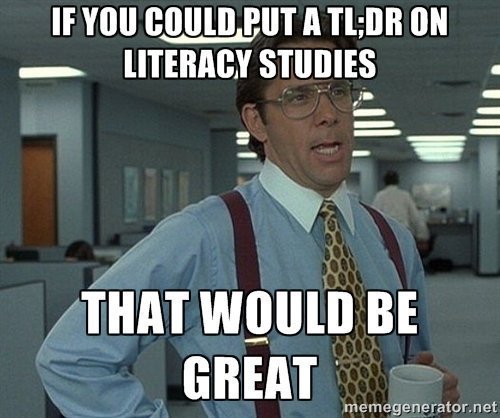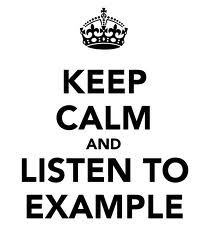Kim’s notes on literacy research:
Definitions/conceptions of literacy
literacy as doing, as a social practice (Barton)
literacy as accomplishing things with reading and writing (Brandt)
Girls use literacy to present a particular kind of self. Literate practices served to mark social boundaries (Finders)
Literacy as the ability to read and write situates literacy in the individual person, rather than in society. The practices of social groups are never just literacy practices; they also involve ways of talking, interacting, thinking, valuing, and believing. Can not pull apart literacy practices from non-literacy practices. (Gee)
Learning to write means learning to write in the ways (genres) those in an activity system write (Russell)
Literacy as a set of socially organized practices, which make use of a symbol system and a technology for producing and disseminating it. Literacy is not simply knowing how to read and write a particular script but applying this knowledge for specific purposes in specific contexts of use. A piece of writing, whatever its form, serves as a flag to signal activities in the ongoing stream of behavior that may have some component skills in common (258). (Scribner and Cole)
Literacy as a shorthand for the social practices and conceptions of reading and writing. ideological model of literacy: concentrate on the specific social practices of reading and writing. significance of socialization process in the construction of meaning of literacy for participants (Street)
How is literacy conceptualized by these researchers:
All of the theorists and researchers offered here see literacy as a social practice. By social practice I borrow from Scribner and Cole’s definition of practice to mean socially developed and patterned ways of using technology and knowledge to accomplish tasks. Literacy is not conceived as simply reading and writing, but ways of using reading and writing in particular contexts. In order to explain this more carefully, I’d like to use Gee and Street’s work:
Ex 1: His general argument: to appreciate language in its social context, we need to focus not on language alone, but rather on what he calls Discourses. Discourses include much more than language: ways of behaving, interacting, valuing, thinking, speaking–ways of being in the world. Ideologies underlie discourses. The way we think, feel, and do is always indebted to the social groups to which we have been apprenticed. Discourse as identity kit–appropriate costume, how to act, talk, write, so as to take on a particular social role that others with recognize. As Gee argues, the practices are never just literacy practices, but are also ways of talking, thinking, valuing and believing.
Ex 2: Street conception of literacy is similar to Gee in that he emphasizes the socialization process of reading and writing. He calls this an ideological model of literacy: concentrates on the specific social practices of reading and writing. significance of socialization process in the construction of meaning of literacy for participants
(autonomous model of literacy: based on “essay-text” form of literacy. Model assumes a single direction in which literacy development can be traced, and associates with it “progress,” civilization, liberty and social mobility. improved cognitive skills. neutral)
Street says that literacy is a shorthand for the social practices and conceptions of reading and writing.
Conceptions of practice
Scribner and Cole: By practice, we mean a recurrent, goal-directed sequence of activities using a particular technology and particular systems of knowledge. A practice consists of: technology, knowledge, and skills (236). Practice always refers to socially developed and patterned ways of using technology and knowledge to accomplish tasks.
Wenger: Practice is always social practice. Practice: Doing in a historical and social context that give structure and meaning to what we do. as soon as members have access to the practice, they find out what counts
Methods for studying
classroom research:
Moll (classroom and home)–funds of knowledge; the children’s household contain ample cultural and intellectual resources. Goal of the teacher is to teach children how to exploit resources in their environment.
Sperling–4 high school teachers, contradictions are normal
Finders (school based)–5 girls, literacy as a way to present self
Heath–teachers in Roadville and Trackton
Barton–reflective practice– observation and asking people to reflect on their practices. describes student projects/research. Students learn about literacy by doing own studies
Brown– rely on Lave & Wenger’s ideas that participation in practice is the main activity through which learning occurs. classroom as community of practice. Ask: what should constitute authentic activity in grade school? students learn to learn (design)
Knoeller–follows Eva as she reflects of text, multiple voices help her to rethink ideas
Ethnography:
Heath: must study literacy in relation to larger sociocultural patterns which they exemplify or reflect. Ethnography must describe literacy events in their sociocultural contexts, so we come to understand such patterns as time and space usage, roles, age, etc are interdependent with the types and features of the literacy events a community develops.
Moll: ethnographic experiments
Scribner and Cole: ethnography–large scale survey data, interviews, experiments/tasks 7 year study. Linked social psychological surveys with field research by Smith.
Unit of analysis:
Russell, activity theory: Unit of analysis is the relations among participants and their shared cultural tools.
relationships
the household
the classroom
the community
Implications for schooling:
Think about practices that are valued in schooling, not simply skills. Think about giving kids access to the work of school–how academics think about, write about, research ideas. To borrow from Brown et al help kids learn to learn, or in the case of literacy learning…help them to think about the purposes for reading and writing in the first place. How is reading and writing used by this group?
Notice that the material conditions matter: what kids can do with reading and writing will shift depending on access to conversations with others, pens, pencils, computers, revision, time to write. And perhaps even help students to see that the material conditions matter. How you read can be affected by the time of day, what you’re reading, etc.
How does the field define literacy as a practice? How is this different from a skills view?
Skills view is seen as something internal, something you learn and pack around, take out when you need it. Shows up in programs like Step Up to Writing; breaking down into sequential parts as opposed to seeing reading and writing as part of larger social practices–people do things with reading and writing.
Street: makes the distinction between autonomous views of literacy and ideological views of literacy. Autonomous model of literacy assumes a single direction in which literacy development can be traced, and associates with it “progress,” civilization, liberty and social mobility. improved cognitive skills. neutral. It is a skill that your learn, put in your pocket, and take it out whenever you need it.
Vygotsky: writing is now taught as a motor skill and not as a complex cultural activity
children need to be taught written language (not taught writing)
Ideological model of literacy concentrates on the specific social practices of reading and writing. What counts as literacy, how reading and writing are viewed, is constructed by participants in a specific context. In this case, we need to think about how we help students to notice the literacy practices that matter in a given context. It may not be enough to teach the five-paragraph essay, for example, unless we also think about when that kind of writing matters. If you think about a practice view of literacy, you might start with purposes for writing before you think about form.
How does this body of work frame an understanding of the activity structures, participation, and material conditions of literacy learning?
Moll–funds of knowledge–how can we tap the resources children have access to at home and at school?
Finders–notion of free choice is never free if literacy is a projection of identity
Knoeller–repeated interaction with texts can facilitate reflection.





 Website:
Website: